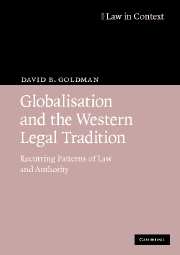Book contents
- Frontmatter
- Contents
- Preface
- 1 Introduction
- Part 1 Towards a Globalist Jurisprudence
- Part 2 A Holy Roman Empire
- Part 3 State Formation and Reformation
- Part 4 A Wholly Mammon Empire?
- 8 The constricted universalism of the nation-state
- 9 The incomplete authority of the nation-state
- 10 The return of universalist law: human rights and free trade
- Part 5 Competing Jurisdictions Case Studies
- Bibliography
- Index
9 - The incomplete authority of the nation-state
Published online by Cambridge University Press: 30 March 2010
- Frontmatter
- Contents
- Preface
- 1 Introduction
- Part 1 Towards a Globalist Jurisprudence
- Part 2 A Holy Roman Empire
- Part 3 State Formation and Reformation
- Part 4 A Wholly Mammon Empire?
- 8 The constricted universalism of the nation-state
- 9 The incomplete authority of the nation-state
- 10 The return of universalist law: human rights and free trade
- Part 5 Competing Jurisdictions Case Studies
- Bibliography
- Index
Summary
Humans at an individual level are the logical starting place for a social philosophy concerned with the significance of norms and the social conditions for human flourishing. Norms, if they are to be successful, should appeal to the interior dimension of the human on the Space Axis of the Space–Time Matrix; not just decreed from the exterior dimension by state legislation. Interior allegiance requires appealing, amongst other things, to shared culture, language and history – to those instincts and institutions which motivate humans in their collective endeavours. Concerning the political implementation of these instincts and institutions, there can be little doubt, at least for the foreseeable future, that the nation-state is, and is likely to remain, the basic unit of international order, and legally paramount with respect to local societies. To speak of the ‘nation-state’ then begs a question, if we are to understand the basics of contemporary human ordering: what is the nature of the nation-state, and, by implication, the separate natures of both the nation and the state? Having considered the immediate Western consequences of the French Revolution, it is at this point of our excavation into Western law and authority that the moral and political attachments of greatest socio-legal significance for today can now be traced.
The cultural foundation of the nation
The ‘nation’ as a concept has been around for thousands of years. For example, the Fourth Book of Moses, Numbers, contains a prophetic reference to Israel amongst the nations. As will become apparent, that idea of the nation is very simple compared with the complexity of nationalism as it erupted in the twentieth century.
- Type
- Chapter
- Information
- Globalisation and the Western Legal TraditionRecurring Patterns of Law and Authority, pp. 196 - 212Publisher: Cambridge University PressPrint publication year: 2008



